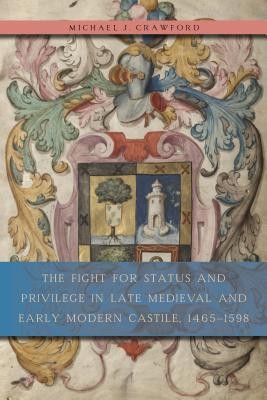
- We will send in 10–14 business days.
- Author: Michael J Crawford
- Publisher: Penn State University Press
- ISBN-10: 0271062908
- ISBN-13: 9780271062907
- Format: 15.2 x 22.9 x 1.5 cm, softcover
- Language: English
- SAVE -10% with code: EXTRA
The Fight for Status and Privilege in Late Medieval and Early Modern Castile, 1465-1598 (e-book) (used book) | bookbook.eu
Reviews
Description
In The Fight for Status and Privilege in Late Medieval and Early Modern Castile, 1465-1598, Michael Crawford investigates conflicts about and resistance to the status of hidalgo, conventionally understood as the lowest, most heavily populated rank in the Castilian nobility. It is generally accepted that legal privileges were based on status and class in this premodern society. Crawford presents and explains the contentious realities and limitations of such legal privileges, particularly the conventional claim of hidalgo exemption from taxation. He focuses on efforts to claim these privileges as well as opposing efforts to limit and manage them. Although historians of Spain acknowledge such conflicts, especially lawsuits associated with this status, none have focused a study on this extraordinarily widespread phenomenon. This book analyzes the inevitable contradictions inherent in negotiation for and the implementation of privilege, scrutinizing the many jurisdictions that intervened in these struggles and debates, including the crown, judiciary, city council, and financial authorities. Ultimately, this analysis imparts important insights about the nature of sixteenth-century Castilian society with wide-ranging implications about the relationship between social status and legal privileges in the early modern period as a whole.
EXTRA 10 % discount with code: EXTRA
The promotion ends in 19d.22:10:54
The discount code is valid when purchasing from 10 €. Discounts do not stack.
- Author: Michael J Crawford
- Publisher: Penn State University Press
- ISBN-10: 0271062908
- ISBN-13: 9780271062907
- Format: 15.2 x 22.9 x 1.5 cm, softcover
- Language: English English
In The Fight for Status and Privilege in Late Medieval and Early Modern Castile, 1465-1598, Michael Crawford investigates conflicts about and resistance to the status of hidalgo, conventionally understood as the lowest, most heavily populated rank in the Castilian nobility. It is generally accepted that legal privileges were based on status and class in this premodern society. Crawford presents and explains the contentious realities and limitations of such legal privileges, particularly the conventional claim of hidalgo exemption from taxation. He focuses on efforts to claim these privileges as well as opposing efforts to limit and manage them. Although historians of Spain acknowledge such conflicts, especially lawsuits associated with this status, none have focused a study on this extraordinarily widespread phenomenon. This book analyzes the inevitable contradictions inherent in negotiation for and the implementation of privilege, scrutinizing the many jurisdictions that intervened in these struggles and debates, including the crown, judiciary, city council, and financial authorities. Ultimately, this analysis imparts important insights about the nature of sixteenth-century Castilian society with wide-ranging implications about the relationship between social status and legal privileges in the early modern period as a whole.


Reviews